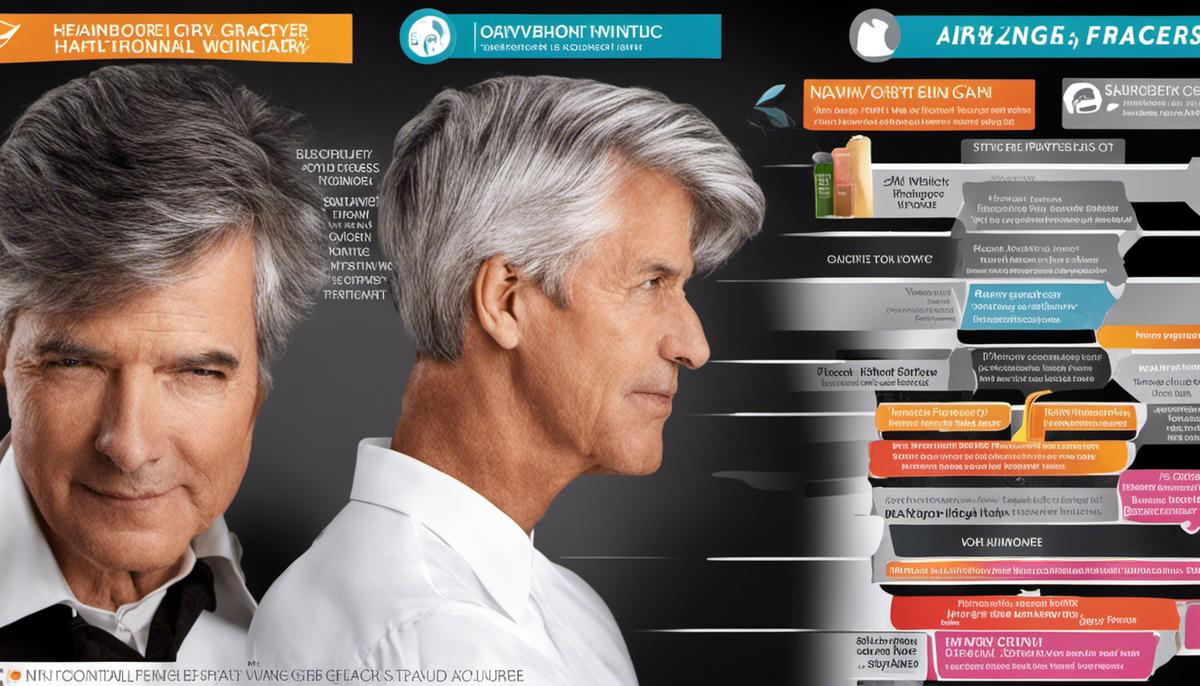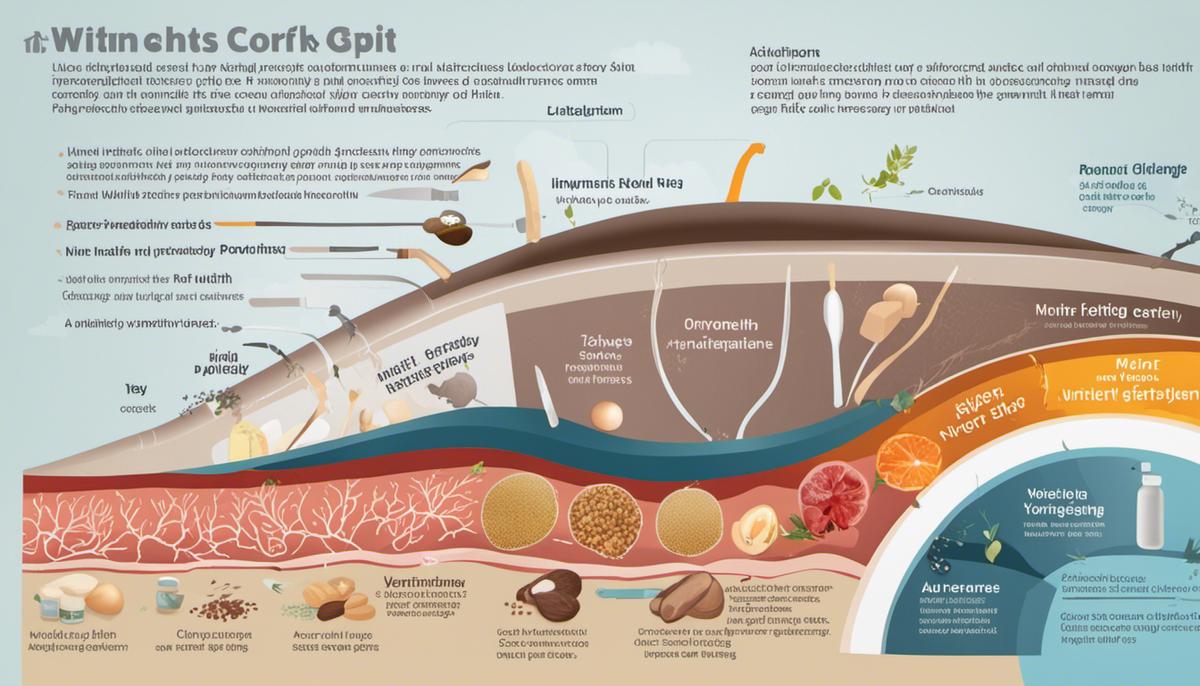In the journey of life, the emergence of gray hair is considered one of the most tangible signs of aging, although not always welcomed with open arms. The silver streaks that decorate one’s head serve as markers of wisdom gained through years of experience, but also indicate a shift in the biological processes that govern our bodies—specifically, an alteration in hair pigmentation. However, turning gray isn’t solely a matter of genetics or chronological aging; nutritional factors play a pivotal role in this process as well. Deficiencies also significantly influence how quickly our hair discolors. Through an understanding of nutrition’s direct effect on our hair health, we can potentially delay the graying process.
Table of Contents
The Biological Process of Hair Graying
The Intricate Relationship between the Biochemistry of Hair Graying and Nutritional Factors
It is fascinating to ponder the indissoluble ties between one’s nutritional habits and the inevitable biological process of hair graying. As much as many would consider this a mere cosmetic concern, delving into the scientific intricacies of this phenomenon reveals remarkable intersections with nutritional biology, genetics, and oxidative stress.
The primary component responsible for the color of our hair is melanin, produced by melanocytes residing at our hair roots. There are two main types: eumelanin (responsible for black and brown hues) and pheomelanin (giving hair red or yellow tones). A person’s unique blend of these melanin types determines the specific coloration of their hair.
With aging, there emerges a gradual decline in the activity of melanocytes, culminating in a reduction, and eventually cessation, of melanin production. This results in the silver-gray or white appearance commonly associated with age. The process, known as canities, seems to be an inherent aspect of human aging. Yet the precise onset time and the rate of hair graying have demonstrated substantial variations amongst individuals, implying influences by various environmental factors, including nutrition.
Emerging research suggests that certain nutritional deficiencies may accelerate the graying process. For instance, low levels of vitamin B-12, observed in individuals adhering to strict vegan diets or with certain malabsorption disorders, have been linked to premature hair graying. Although the precise mechanism remains elusive, it is hypothesized that vitamin B-12 plays a pivotal role in the synthesis of DNA and RNA, making it integral to the optimal functioning and replication of melanocytes.
Additionally, copper plays crucial roles in various enzymatic reactions, including the production of melanin. Consequently, dietary deficiency in copper could potentially disrupt normal melanin biosynthesis, accelerating hair graying.
An aspect of nutrition that holds significant implications for hair graying pertains to oxidative stress. The imbalance between the production of harmful free radicals and the body’s ability to counteract their harmful effects through antioxidants could exacerbate melanocyte degradation, prompting premature hair graying. Diets rich in fruits and vegetables, known for their abundantly high antioxidant content, have thus been postulated to have potential delaying effects on the graying process.
Scientific understanding of the complex interplay between nutrition and hair graying is evolving. Ongoing research is shedding light on the myriad factors that manipulate the ticking melanin clock within our hair follicles. As daunting as the intricacies of this subject may be, an appreciation for the intricate machinery of our biology and its susceptibility to nutritional modulation promotes a greater understanding and acceptance of our remarkable bodies in the grand scheme of life’s aging process.

Nutrients and Their Impact on Hair Health
Integral Nutrients and Micronutrients: Unveiling their Importance in Hair Health and Color
As we delve further into the captivating world of human dermatology, much attention continues to focus on hair health and color. The dynamics of hair properties is not simply a cosmetic concern, but mirrors deeper biological processes. Fostering cells specialized for hair growth and pigmentation demands a host of valuable nutrients.
Continuing the discussion from where we left off, the importance of iron must be underscored. Iron isn’t just vital for rich, oxygenated blood; it holds a consequential place in our hair’s growth and color. A deficiency leads to a disruption in the hair growth cycle, and in some cases, to premature graying. This justifies the medical community’s interest in iron and its effects on hair condition, emphasizing the importance of proper iron intake for individuals who suffer from such hair anomalies.
Equally significant is Vitamin D, often referred to as the ‘sunshine vitamin.’ While it’s widely recognized for its pivotal role in bone health and immunity, recent studies indicate an apparent connection between Vitamin D and hair health. It helps in the creation of new hair follicles, improving hair thickness and reducing hair loss. Vitamin D’s role in melanin biosynthesis suggests that its deficiency could contribute to issues of hair pigmentation.
Advances in scientific literature recommend the beneficial effects of Omega-3 fatty acids in a diversity of health aspects, including hair health. Hair follicles rely considerably on this nutrient, where a deficiency may result in dry, brittle hair indicative of poor health. Moreover, preliminary studies suggest a role in delineating hair color, though further research is necessary to fully substantiate this.
Another nutrient evolving as a promising contributor to healthy hair color is Zinc. Zinc, a well-regarded element in wound healing, has also been implicated in processes crucial to hair health, such as DNA replication, protein synthesis, and division of follicle cells. Research conducted suggests that Zinc deficiency may lead to hair color changes, alluding to a role in hair pigmentation. However, more work is to be done to unveil the complex interactions and signaling pathways involved.
Arguably, a nutrient that could be overlooked in maintaining hair health is Biotin- a water-soluble vitamin part of the Vitamin B suite. With its crucial role in energy metabolism and fatty acid synthesis, emerging research suggests that biotin deficiency, albeit rare, could lead to hair discoloration and loss.
Lastly, the focus shifts to an amino acid principally recognized for heart health but intriguingly seems to have a role in hair health- L-Lysine. Studies suggest, it assists in the absorption of iron and zinc, nutrients essential for healthy hair. Furthermore, its role in collagen formation hints that a deficiency may influence hair color, texture, and strength.
As we navigate through the labyrinth of complex but fascinating interactions between various nutrients and hair health, the precision and breadth of scientific research aiding that journey provide vital intelligence for improving human health. As scientists and scholars, we remain enthusiastic in our relentless pursuit of intricacies underpinning hair biology, ready for the next labyrinth, the next challenge.

Dietary Recommendations to Prevent Gray Hair
Building on the already substantial understanding of how nutrition impacts hair graying, a more nuanced exploration is warranted. Notably, the significance of iron, vitamin D, Omega-3 fatty acids, zinc, biotin, and L-Lysine, among other nutrients, will be examined. These are worthy of consideration owing to their intricate relationship with hair health and color.
Iron plays a pivotal role in keeping hair follicles healthy and facilitating optimal hair growth. It operates in tandem with tyrosinase, a copper-containing enzyme, which plays a vital role in melanin production. Ensuring sufficient iron intake can potentially protect against hair graying and loss.
Similarly, vitamin D, best known for its role in bone health, has recently surfaced as a key player in maintaining hair health and pigmentation. The vitamin encourages the creation of new hair follicles and possibly influences the activity of melanocytes within existing follicles, with a deficiency possibly linked to graying and hair loss.
Omega-3 fatty acids, often lauded for their anti-inflammatory properties, also offer benefits for hair health. They nourish the hair, support hair thickening, and can reduce inflammation that can lead to hair disorders.
Zinc, a trace mineral, exerts its influence on protein synthesis and cell proliferation, which are vital processes for hair growth and pigmentation. Notably, a zinc deficiency can influence melanin production, thereby affecting hair color.
Biotin, another critical micronutrient, is integral to the health of hair. A deficiency can lead to hair loss and graying. While biotin’s precise role in hair color is still being elucidated, its influence on keratin infrastructure, a protein fundamental for healthy hair, is well established.
Finally, there’s L-Lysine, an essential amino acid that aids in the absorption of iron and zinc. It seems to play a role in hair health through this indirect function. Without enough L-Lysine, the body might not absorb these crucial nutrients effectively, potentially leading to hair aging signs like graying and thinning.
In sum, it’s clear that a well-rounded and strategic dietary approach can support hair health and pigmentation, potentially slowing down graying. It’s a burgeoning area of research that’s sure to yield even more fascinating insight into this universal sign of aging in the future.

Nutrition plays a significant part in most aspects of our health, hair pigmentation being no exception. While we may not be able to altogether halt the march of time exhibited by the graying of our hair, ensuring proper dietary habits and sufficient nutrient intake can help in maintaining hair vitality and color for longer. The complex association between nutrition and hair health underscores the necessity of a well-balanced, nutrient-rich diet. In essence, what we feed our bodies directly mirrors in the health and color of our hair. After all, gray hair prevention may be at the end of our fork. Embrace a healthier diet regime and make the fight against gray hair a flavorful journey.

Rajan Moonbeam is a dedicated health writer with a Master of Public Health (MPH) degree. Specializing in holistic wellness and preventive care, Rajan combines scientific research with natural approaches to health, offering readers practical advice on living their healthiest life. His work is a beacon for those seeking to navigate the path to well-being with integrity and balance.

